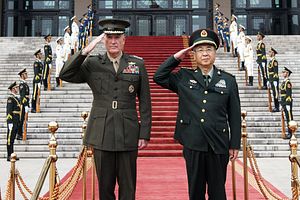As North Korea threatened to attack Guam and tensions over Korean peninsula kept escalating, China and the United States decide to deepen military cooperation despite different opinions on multiple issues.
On August 15, U.S. Marine Corps General Joe Dunford, chairman of the Joint Chiefs of Staff, visited China’s defense ministry in Beijing and met his counterpart Fang Fenghui, chief of the People’s Liberation Army (PLA)’s Joint Staff Department. Both top military officials agreed to further develop military relations and build a new communication mechanism to reduce miscalculations. Somewhat unusually, the meeting has been reported on by Chinese media in detail.
According to China’s defense ministry, the next day, Dunford will visit a military base in the PLA’s Northern Theater Command and observe a military exercise by the Chinese military. Dunford is the highest-ranking military official to visit China since Trump took office.
During the meeting, Fang’s remarks showed China’s strong will to maintain good military relations with the U.S. “Cooperation is the only right option for China and the US, and the two sides could be great partners,” Fang said to Dunford. “The Chinese military is willing to work with its U.S. counterpart to strengthen mutual understanding and trust, deepen cooperation and manage risks and differences in an appropriate and effective manner.”
In response, Dunford expressed goodwill in his remarks as well, but in a more straightforward way, according to the U.S. Department of Defense. He told Fang: “To be honest, we have many difficult issues where we will not necessarily have the same perspectives, but… I know we share one thing: we share a commitment to work through these difficulties. With the guidance from our presidents and the areas of our cooperation, I know we will make progress over the next few days.”
Thus, Dunford requested PLA to be more candid in the future communication, although his own “candid” remarks haven’t been fully reported by China’s media:
[T]he two countries must make tangible progress…I think our collective challenge is to sincerely and with candor attack these issues that we have to address…The military-to-military contacts between the United States and China are important because there will always be some friction between the two countries…lessening miscalculation is the minimum standard for military-to-military contacts…We should also try to see areas to cooperate.
It’s obvious that the U.S. side didn’t expect too much out of the new communication mechanism and “reducing the chances of miscalculations” is the priority. However, as some officials of the U.S. Joint Staff said, “These communications are especially crucial now, as the region and world are facing the dangers of a nuclear-armed North Korea.”

































